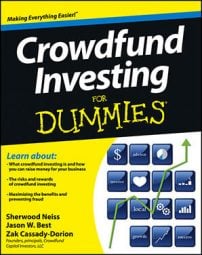When you meet your funding target, all your hard work finally translates into the dollars you need to turn your ideas into real products or services. But because you’re potentially receiving small dollar amounts from lots of different investors, how do you actually get the cash into your hands? The type of funding platform you use for your crowdfund investment campaign determines how you receive your money:
Online funding portal: Most likely, you registered with an SEC-approved online funding portal that exclusively hosts crowdfund investment campaigns. These portals are required by law to outsource the cash management process to a third party. That’s because funding portals are recent startups (they didn’t exist prior to the 2012 legislation that legalized crowdfund investing).
Startups carry some risk, and if your particular funding portal goes out of business for some reason, this requirement reduces the risk of your cash disappearing. The third party is an escrow agent that moves the cash into your business bank account.
Broker-dealer: If you register your idea with a broker-dealer, which is more expensive than using an online portal, this person or company manages (holds) the cash for you without the involvement of a third party.
That’s because broker-dealers (unlike funding portals) are generally established entities with long company histories. (The risk of one of them shutting its doors is not very high.) The broker-dealer itself moves the money into your account.
How can you be certain where your money will come from? Before you list your pitch with a funding platform, you need to find out what kind of portal it is. The platform’s terms and conditions or its “About Us” page on its website should tell you.
The JOBS Act prescribes a 21-day window between your campaign pitch going live and your ability to collect your cash. If you’re extremely lucky and you hit your funding target on Day 10 of your campaign, for example, you won’t be able to get any cash until Day 22.
Why does this provision exist? It gives investors time to uncover any attempts at fraud and offers investors the right to change their minds and get their cash back. However, if you hit your funding target on Day 45 of your campaign, you can immediately get your cash from either the escrow agent or the broker-dealer.
If anyone is trying to swindle the crowd, a few weeks should be sufficient for potential investors to root out the fraudulent intent, spread the word, and shut down the campaign.
When you first sign your contract with the funding portal or the broker-dealer that will host your campaign, ask how long it takes to get your cash after you hit your funding target. The terms differ from escrow agent to escrow agent and broker-dealer to broker-dealer.
You also want to find out whether the cost of transferring the money is included in the success fee that the platform charges when you hit your funding target or is a separate fee. If it’s a separate fee, make sure you know how much the money transfer is going to cost so you aren’t facing any surprises.
You also want to confirm with your bank whether it charges any fees related to receiving the money into your account — particularly if the money is wired. Again, you want to be sure you’re prepared for the true costs associated with your venture so you don’t face any unpleasant surprises.

